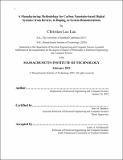| dc.description.abstract | Electronics is approaching a major paradigm shift because silicon transistor scaling no longer yields historical energy-efficiency benefits, spurring research towards beyond-silicon nanotechnologies. In particular, carbon nanotube field-effect transistor (CNFET)-based digital circuits promise substantial energy-efficiency benefits, but the inability to perfectly control intrinsic nanoscale defects and variability in carbon nanotubes has precluded the realization of very-large-scale integrated systems. In this thesis, I overcome these defects and variations to enable, for the first time, a demonstration of a beyond-silicon modern microprocessor: RV16XNANO, designed and fabricated entirely using CNFETs. RV16X-NANO is a 16-bit microprocessor based on the open-source and commercially available RISC-V instruction set processor, running standard RISC-V 32-bit instructions on 16-bit data and addresses. It integrates >14,000 CMOS CNFETs, and operates as modern microprocessors do today (for example, it can run compiled programs; in addition, we demonstrate its functionality by executing all types and formats of instructions in the RISC-V instruction-set architecture). This is made possible by the manufacturing methodology for CNTs (MMC)—a set of original processing and circuit design techniques that are combined to overcome the intrinsic CNT challenges.
Importantly, the entire MMC and all of the work in this thesis are wafer-scale, VLSI-compatible and is seamlessly integrated within existing infrastructures for silicon CMOS—both in terms of design and of processing. Together, the contributions of this thesis establish a robust CNT CMOS technology and represent a major milestone in the development of beyond-silicon electronics. | |
